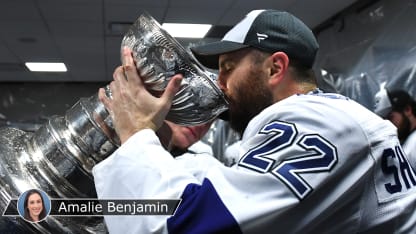Kevin Shattenkirk had just scored an overtime goal in Game 4 of the Stanley Cup Final, pushing the Tampa Bay Lightning to within one win of the Stanley Cup, which they won Monday with a 2-0 victory against the Dallas Stars in Game 6 of the best-of-7 series at Rogers Place in Edmonton.
Shattenkirk redeems himself, helps Lightning win Stanley Cup
Defenseman regains form, rebounds from disappointing two seasons with Rangers

Injured captain Steven Stamkos, relegated to 2:47 of play throughout the Lightning's entire postseason run, welcomed the defenseman off the ice after that Game 4 goal.
The two men embraced, one in hockey gear, one in street clothes. It was a moment of celebration, of joy, a "job well done" and a "thank you" and an understanding the best-laid plans don't always work out as intended.
For Shattenkirk, there was relief and redemption. The championship was the culmination of years of hard work and sacrifice, one of the highest highs possible in hockey, a little more than a year after one of his lowest lows.
Because Shattenkirk wasn't supposed to play in or win the Stanley Cup with the Lightning. That was supposed to happen with his hometown New York Rangers, who signed him to a four-year contract worth $6.65 million annually July 1, 2017.
TBL@DAL, Gm4: Shattenkirk nets PPG, wins Game 4 in OT
But on Aug. 1, 2019, after two seasons, the Rangers bought out his contract. His time in New York was over after 119 games.
"It was obviously very painful to watch him go through the process of something that was supposed to be so fabulous and something that I think in the back of his head he always wanted and was always driving toward," Shattenkirk's longtime agent Jordan Neumann said. "To see it just not work out was very painful for everybody that loves him and cares about him."
The New York experiment, seen as a homecoming for Shattenkirk that would keep the Rangers in Stanley Cup contention, ended in a rebuild he would not be participating in. The Rangers had been to the Stanley Cup Playoffs seven consecutive seasons, including the Final in 2014 and Eastern Conference Final the following season. But after Shattenkirk arrived, they missed the playoffs in 2018 and 2019.
The Washington Capitals, Shattenkirk's team in 2016-17, won the Cup in 2018. The St. Louis Blues, his team from 2010-17, won in 2019.
He didn't know what the future held.
"[You] don't really know which way is up at that point or how the chips are going to fall," Shattenkirk said. "It was tough to watch my former teams the two years prior win Stanley Cups, groups of guys that I had been with and become close with. It makes you wonder. It makes you think."
His phone started ringing. Though most teams already had committed to the bulk of their free agents, teams scrounged for space to score Shattenkirk. He looked at the Lightning, and in Tampa Bay's defenseman group he saw a strong core of left shots, which would allow him to pair with Victor Hedman, Ryan McDonagh or Mikhail Sergachev, a dream for any right-shot defenseman.
He signed for one season and $1.75 million, four days after the Rangers bought out his contract.
"In my mind, when everything happened last summer, my goal was to get myself in a position to prove myself and show that I could still be a player in this League," said Shattenkirk, scheduled to become an unrestricted free agent Oct. 9.
DAL@TBL, Gm2: Shattenkirk buries shot through traffic
The Lightning were thrilled. They had added forward Patrick Maroon and defenseman Luke Schenn, and believed the three veterans would make the difference after a 2018-19 season when they finished with 128 points, the fourth most in NHL history, but were swept in four games in the Eastern Conference First Round by the Columbus Blue Jackets. They had to make changes, including to the team culture, and Shattenkirk was a big piece of that.
"Ultimately, when you're trying to put all the pieces of the puzzle together, you're accumulating talent," Lightning general manager Julien BriseBois said, "but really you're building a team, and they were all key pieces in helping this picture come together for us this year."
This was their vision. This was Shattenkirk's vision.
Just a bit farther south than he had intended.
"The second half of the two years was eye-opening of how he wanted to play on a winning team, and how important it was to win," Neumann said. "Being in a place where he knew he could win, I think he really perked up. I think he obviously did feel like he had something to prove, that what happened in New York was really not who he was as a player. And you put those two things together and I'm not even a little bit surprised that he's had an outstanding year."
Shattenkirk scored 34 points (eight goals, 26 points) in 70 games this season and was plus-22, and scored 13 points (three goals, 10 assists) in 25 postseason games. Always dangerous on the power play, he found a fit as a piece of a defenseman group that has players with bigger roles. The Lightning let him be the player he was when he found a home with the Blues.
When Ken Hitchcock coached him in St. Louis for six seasons, Shattenkirk was efficient. He didn't force his offensive game. He moved the puck well. He let the game come to him. That didn't happen in New York.
There, nothing went as planned. The Rangers missed the playoffs in 2018. Shattenkirk finished with 23 points (five goals, 18 assists) in 46 games, one season removed from scoring 56 (13 goals, 43 assists) in 80 games between the Blues and Capitals. He was minus-14. The next season he scored 28 points (two goals, 26 assists) in 73 games for New York and was minus-15.
Instead of being a piece, Shattenkirk seemed to feel the need to be the main piece. It wasn't what had made him sought after as a free agent or had made him successful. It wasn't even really who he was as a person. As Neumann said, "As much as he'll tell you he's a great golfer, there's no doubt when you spend time with Kevin that he was born to play a team sport."
That wasn't the way he was playing in New York.
"You feel like, here's a team that recruited me, they wanted me, and I've got to produce," Hitchcock said. "So sometimes you get stuck in trying to produce rather than just fit in. … And then all of a sudden the internal pressure on yourself starts to really mount, and it's hard. It's hard for players to sort through that stuff."
But there were lessons in New York. Crucial ones.
"I think it made him a better person, it made him a better hockey player," Neumann said. "Did it work out? No. But he's also the first guy to say he has no regrets because he wanted to see what it was like to play for his hometown team. And had he not taken that opportunity he would have regretted not having experienced it. So yes, it didn't work out. But no regrets. You move forward as a better person and a better player."
He became exactly that with Tampa Bay, going back to his roots, fitting in perfectly on the ice and in the dressing room, taking on some of the leadership role the Lightning needed filled.
And he let the experience with the Rangers drive him, push him.
"I've said it before, I never kind of forget what happened last summer," Shattenkirk said. "I've used that to fuel me and just not get comfortable."
Game 4 on Friday was, in some ways, a microcosm of what Shattenkirk has been through in the past year-plus.
The tying goal by Stars center Joe Pavelski with 8:25 remaining in the third period had gone in off Shattenkirk's knee. But Shattenkirk was undaunted. With the Lightning on the power play in overtime, he took a wrist shot from the right face-off circle.
It went in. Once again, he was redeemed.
His lowest low had vaulted him as high as he has ever been in his career.
"I think the whole hockey world is able to sit back now and … hopefully appreciate what we all knew two, three, four, even eight or nine years ago about just how good a player he is," Neumann said. "And I think maybe with the bumps in the road here the last two years, maybe that was forgotten a little bit.
"So if there's some redemption in that, I think that's fantastic."

















